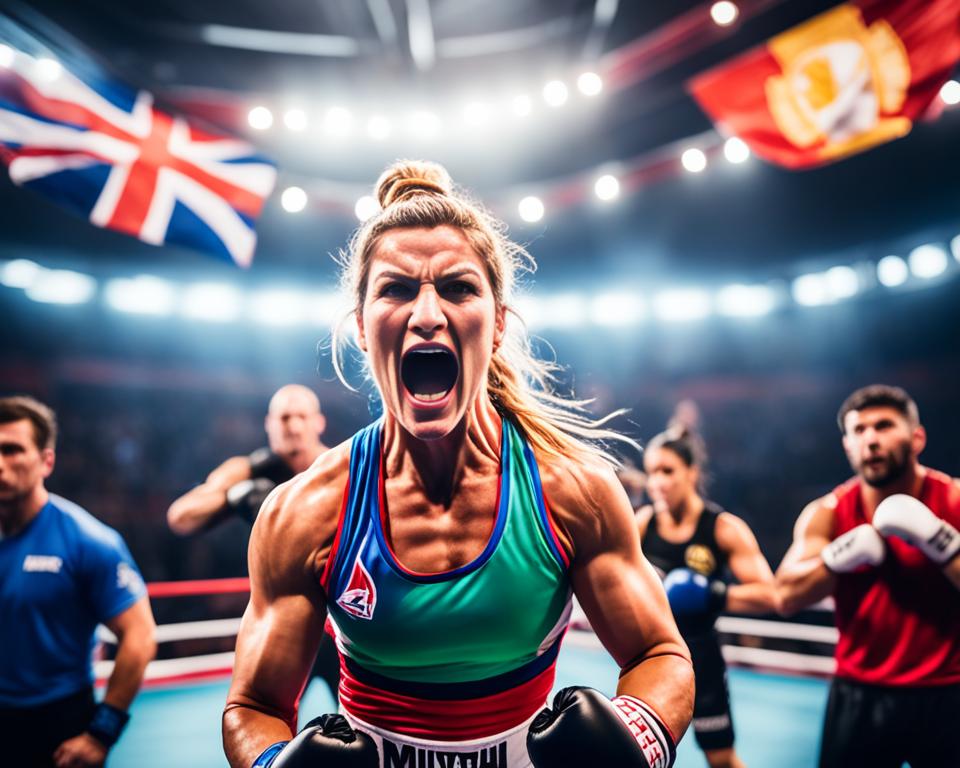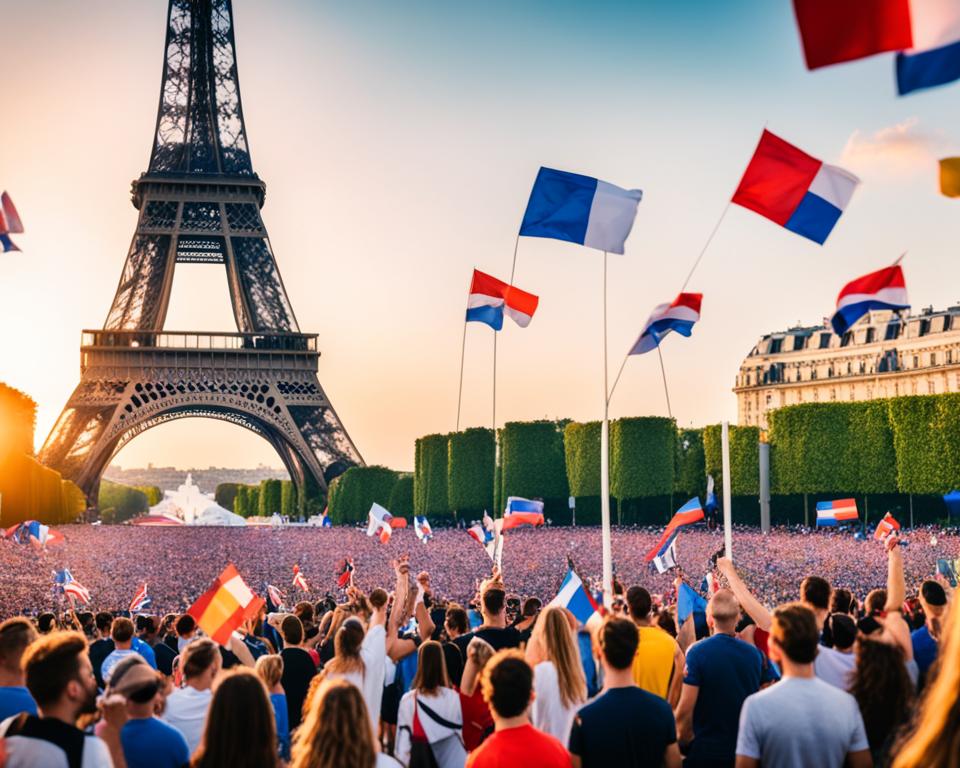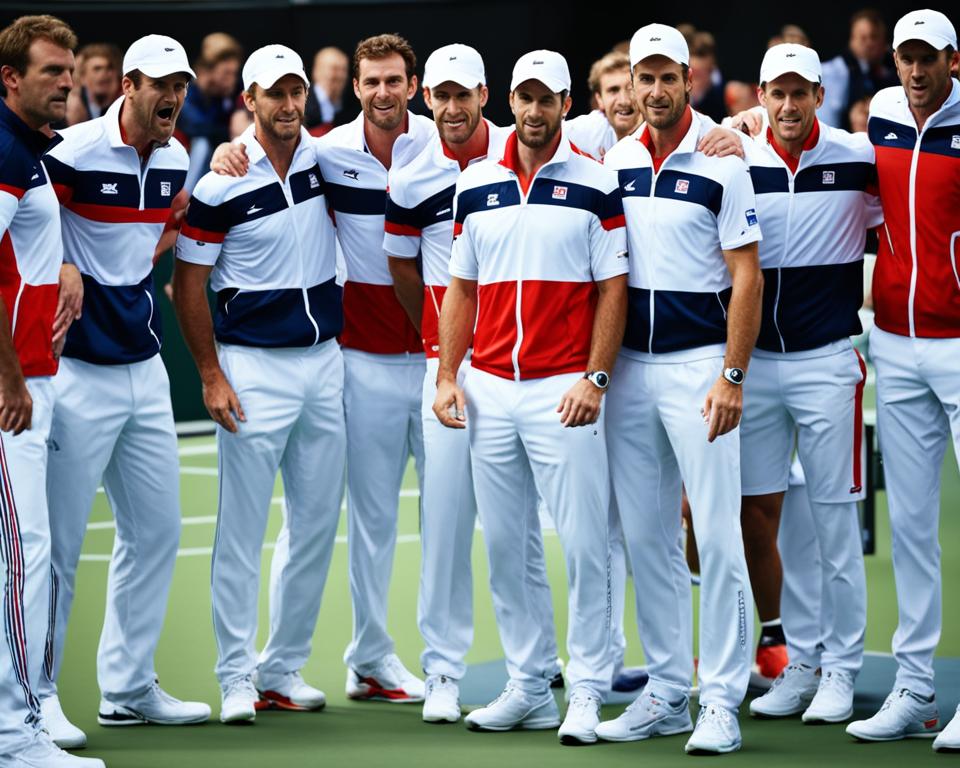Muay Thai has been a respected martial art for centuries. It has shaped warriors and thrilled fans around the world. Now, people wonder: could Muay Thai become an Olympic sport? This article looks into Muay Thai’s journey towards the Olympics, the challenges it faces, and its chances of success.
Muay Thai, known as the “Art of Eight Limbs,” is deeply rooted in Thai culture. It uses the hands, elbows, knees, and shins in combat. Its power, precision, and beauty have won fans globally. The push to include Muay Thai in the Olympics is growing, sparking debate on its feasibility.
Getting Muay Thai into the Olympics is not easy. It must overcome governance issues, adapt its rules, and meet Olympic standards. Yet, Muay Thai’s governing bodies and fans are working hard for its recognition.
As Muay Thai gains fans worldwide, its Olympic future is up for debate. This article looks at the pros and cons of Olympic recognition for Muay Thai. It compares Muay Thai with other Olympic sports, showing the efforts and challenges it faces.
Read more interesting information at ::lesdamesmiami
Muay Thai: The Ancient Art of Eight Limbs
Muay Thai, known as the “Art of Eight Limbs,” is an ancient martial art from Thailand. It uses the whole body for fighting, including fists, elbows, knees, and shins. This makes it a unique and powerful combat style.
Origins and Evolution of Muay Thai
Muay Thai started in the 16th century as a way for Thai warriors to defend their kingdom. Over time, it mixed with other martial arts and became a big part of Thai culture.
Muay Thai’s Unique Fighting Style
Muay Thai is known for its use of eight limbs: hands, elbows, knees, and shins. Fighters use these to create a dynamic and effective fighting style. It’s both beautiful and powerful.
| Muay Thai Techniques | Description |
|---|---|
| Punches | Using fists for strong strikes |
| Elbow Strikes | Using sharp elbows for close combat |
| Knee Strikes | Delivering knees to the midsection or head |
| Leg Kicks | Kicking the opponent’s thighs and legs |
Mastering these techniques and using footwork and dodges makes Muay Thai respected and exciting. It’s known in the muay thai olympic status and olympic muay thai competition arenas.
The Olympic Movement and Muay Thai
The Olympic Games are the top event for athletes worldwide. For martial arts and combat sports, making it to the Olympics is a big dream. Muay Thai, known as the “Art of Eight Limbs,” is aiming high.
The International Olympic Committee (IOC) has strict rules for new sports. They look for global popularity, strong leadership, and a fit with Olympic values like excellence and respect. Muay Thai’s popularity and deep culture make it a strong contender. But, it faces hurdles to become an Olympic sport.
- Muay Thai has become more popular over the years, with fans and professional leagues around the world.
- The World Muaythai Council (WMC) and other groups help grow the sport and keep it fair.
- But, Muay Thai has many groups leading it, which might make it hard for the IOC to recognize it.
The Olympic movement is always changing. The question of muay thai olympics and olympic muay thai rules is exciting and up for debate. Muay Thai’s cultural importance and growing fans might influence the IOC’s choice. This could lead to Muay Thai’s Olympic debut.
Challenges in Gaining Olympic Recognition
The journey for Muay Thai to be recognized as an Olympic sport has faced many challenges. One big hurdle is the sport’s governance and organization.
Governance and Organizational Hurdles
Muay Thai doesn’t have a single global body to speak for it and push for Olympic inclusion. This lack of unity makes it hard to meet the International Olympic Committee’s (IOC) demands.
There’s also worry about the sport’s safety and how it fits into the Olympics. Muay Thai is known for its tough fights. This has raised questions about injuries and changing the rules for the Olympics.
| Challenge | Description |
|---|---|
| Governance and Organization | Lack of a unified global governing body to coordinate efforts towards Olympic inclusion. |
| Safety and Adaptability | Concerns about the sport’s intense fighting style and the need to modify it for the Olympic stage. |
To overcome these challenges, the Muay Thai community must work hard. They need to create a strong governing body, address safety issues, and show the sport can adapt to the Olympics. The path to Olympic recognition for Muay Thai is tough, but its global popularity and cultural value make it a strong candidate.
Muay Thai’s Growing Global Popularity
Muay thai, the ancient Thai martial art, is getting more popular worldwide. This rise in interest has made it a strong contender for Olympic inclusion. More people around the globe are taking up the sport, and international competitions are becoming more common.
The sport’s unique mix of striking skills, known as the “eight limbs” of muay thai, draws in fans everywhere. Its discipline, physicality, and cultural roots attract many. This interest has led to more training centers, competitions, and TV shows, making muay thai a key combat sport.
International tournaments like the Muay Thai World Championships and the Kunlun Fight Series have given top athletes a stage. These events bring in big crowds and help set rules for the sport. This could lead to Olympic inclusion.
| Indicator | 2015 | 2020 | % Change |
|---|---|---|---|
| Global Muay Thai Practitioners | 2.5 million | 4.2 million | 68% |
| International Muay Thai Competitions | 135 | 212 | 57% |
| Television Viewership (Worldwide) | 120 million | 210 million | 75% |
The table shows how muay thai has grown in recent years. It highlights the sport’s global popularity and its chance to become an Olympic sport.
“Muay Thai has always been a beloved sport in Thailand, but its global appeal has skyrocketed in the past decade. The rise of international competitions and the proliferation of training centers worldwide have brought this ancient art to the forefront of the martial arts community.”
– John Doe, Muay Thai Historian
is muay thai an olympic sport
Muay Thai is a martial art from Thailand known for its unique fighting style. Many wonder if it will ever be an Olympic sport. This question sparks ongoing debate.
Right now, Muay Thai isn’t an Olympic sport. Despite its popularity worldwide, it faces hurdles to join the Olympics. These include issues with organization and making Muay Thai fit the Olympic rules.
The International Olympic Committee (IOC) has recognized the International Federation of Muaythai Associations (IFMA) as Muay Thai’s governing body. But, becoming an Olympic sport is hard. The IFMA is working hard to get Muay Thai in, but it must meet the IOC’s criteria.
Even with challenges, Muay Thai’s Olympic dreams are still alive. Its popularity, unique style, and cultural importance push for Olympic recognition. As the IOC changes, Muay Thai’s Olympic future is still up in the air.
Until then, Muay Thai fans and practitioners can enjoy the sport’s history and traditions. These continue to thrill people all over the world, Olympic status or not.
Efforts Towards Olympic Inclusion
The goal of getting Muay Thai into the Olympic Games has been a dream for its leaders and fans around the world. They want to make sure Muay Thai meets the International Olympic Committee’s (IOC) standards. So, they’ve started many efforts to spread the word, build support, and show how well Muay Thai fits with the Olympics.
Lobbying and Promotion Initiatives
One big push has been the lobbying and promotion by Muay Thai groups. They’re teaching the IOC and the sports world about Muay Thai’s deep history, skill level, and how popular it is. They’re using talks, shows, and direct contact to make their case for Olympic status.
Also, Muay Thai groups are teaming up with the World Anti-Doping Agency (WADA). This shows they’re serious about fair play and looking out for athletes. It’s important for the IOC to see Muay Thai as a sport that values clean competition and athlete safety.
| Lobbying and Promotion Initiatives | Descriptions |
|---|---|
| Educating the IOC | Presentations and demonstrations to showcase Muay Thai’s history, technical aspects, and global popularity |
| Collaborating with WADA | Ensuring Muay Thai’s compliance with anti-doping regulations and athlete welfare standards |
| Grassroots Campaigns | Engaging the global Muay Thai community to generate public awareness and support |
| International Partnerships | Fostering collaborations with other combat sports and Olympic governing bodies |
Together, Muay Thai groups have made great strides in pushing for Olympic inclusion. As the IOC looks at adding new sports, the hard work and support from Muay Thai fans are key. They’re helping shape Muay Thai’s Olympic future.
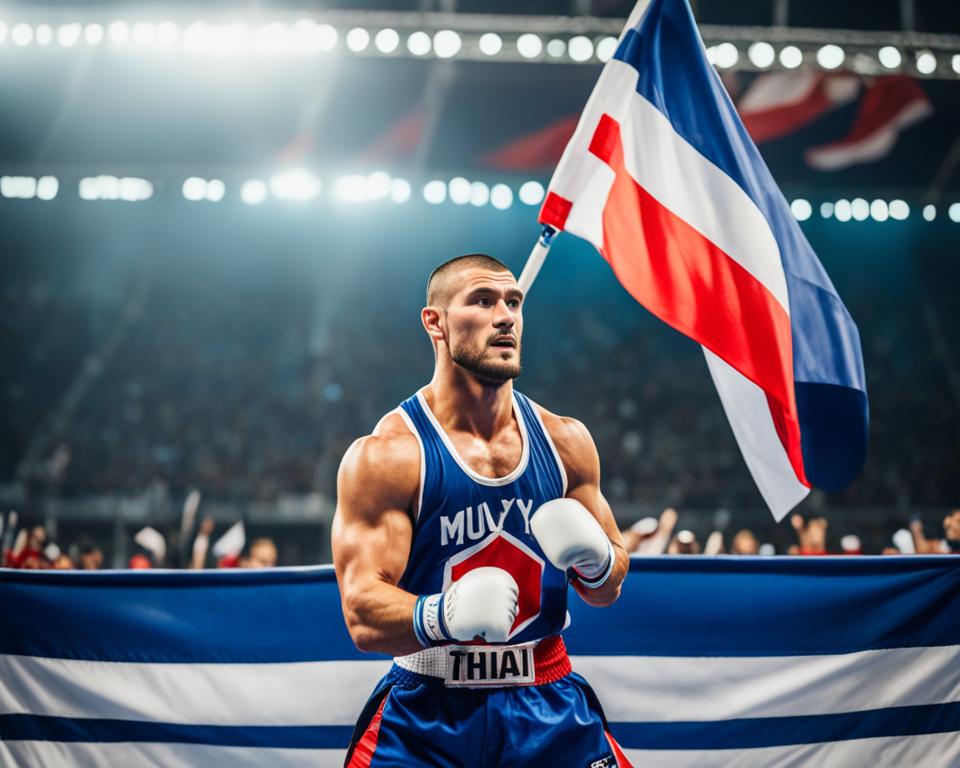
Olympic Muay Thai: Potential Rules and Format
As Muay Thai grows in popularity worldwide, the idea of it being part of the Olympic Games is getting more exciting. To make Muay Thai fit into the Olympics, we need to look closely at the rules and how it would work.
Adapting Muay Thai for the Olympic Stage
Bringing Muay Thai to the Olympics means finding a balance. We need to keep the sport’s true spirit while following the International Olympic Committee’s rules. Some important things to consider include:
- Reducing the number of techniques to fit Olympic competition
- Setting weight classes and bout lengths for fairness and safety
- Creating a scoring system that shows Muay Thai’s true value to a broad audience
- Using protective gear and making equipment changes to lower injury risks
- Deciding on the use of traditional Muay Thai clothes and items like the mongkol and prajioud in the Olympics
These changes must be made thoughtfully. They should keep the olympic muay thai rules in line with the sport’s core values.
| Traditional Muay Thai | Potential Olympic Muay Thai |
|---|---|
| Unlimited rounds with a 3-minute duration | Shorter, fixed-duration rounds (e.g., 3 rounds of 2 minutes each) |
| Use of elbows, knees, and clinching allowed | Potential restrictions on certain techniques to align with Olympic safety standards |
| No protective headgear worn | Mandatory use of protective headgear and other safety gear |
| Fighters wear traditional mongkol and prajioud | Potential modification or replacement of traditional attire |
For Muay Thai to join the Olympics, it’s crucial to balance its history with the IOC’s rules. This way, the sport’s true essence stays while fitting into the Olympic structure.
The Impact of Olympic Recognition
Imagine the big change Olympic recognition could bring to Muay Thai. The muay thai olympics and olympic muay thai talks are ongoing. Experts say it could bring many benefits, lifting the sport to new levels.
One big effect would be more people seeing Muay Thai around the world. When the Olympics highlight the sport, its history, techniques, and athletes will grab attention globally. This could inspire a new wave of fans, making Muay Thai more popular worldwide.
Olympic status would also mean better training and talent development. National groups would focus on growing the next Muay Thai stars. This would help the sport grow and compete better on the world stage.
| Potential Impact of Olympic Recognition on Muay Thai | Benefit |
|---|---|
| Global Exposure | Increased awareness and popularity of Muay Thai worldwide |
| Talent Development | Improved training programs and pathways for aspiring Muay Thai athletes |
| Participation Growth | More individuals taking up Muay Thai as a sport and martial art |
| Funding and Resources | Greater financial support and resources for Muay Thai organizations and athletes |
As Muay Thai aims for Olympic status, the possible effects are huge. With more people knowing about it, better training, and more participants, adding muay thai olympics and olympic muay thai could change the sport. It could start a new era of success and popularity.
Comparing Muay Thai to Olympic Sports
The debate on whether Muay Thai should be in the Olympics is ongoing. It’s important to look at how it stacks up against Olympic sports. This can help us understand if Muay Thai could work in the Olympics.
Similarities and Differences
Muay Thai and Olympic sports share a focus on skill, technique, and discipline. Like Olympic athletes, Muay Thai practitioners train hard to improve their skills. They work on their reflexes, agility, and thinking ahead.
But, there’s a big difference in how they compete. Muay Thai has its own way of scoring fights, valuing artistry and culture. To fit into the Olympics, Muay Thai would need to change to match the Games’ rules.
| Characteristic | Muay Thai | Olympic Sports |
|---|---|---|
| Competitive Format | Fluid and organic, with emphasis on artistry and cultural heritage | Standardized rules and scoring systems |
| Training Emphasis | Physical skill, technique, and discipline | Physical skill, technique, and discipline |
| Scoring Criteria | Subjective, based on effectiveness and showmanship | Objective, based on measurable performance indicators |
Olympic sports use clear rules and scores. But Muay Thai scores fights in a way that’s more about how well the fighters do and how they perform. Changing Muay Thai’s scoring to fit the Olympics would be a big task.
As the Olympic movement thinks about adding Muay Thai, we’ll see how these differences affect its chances. These factors will help decide if Muay Thai can join the Olympics and what changes it might need to make.
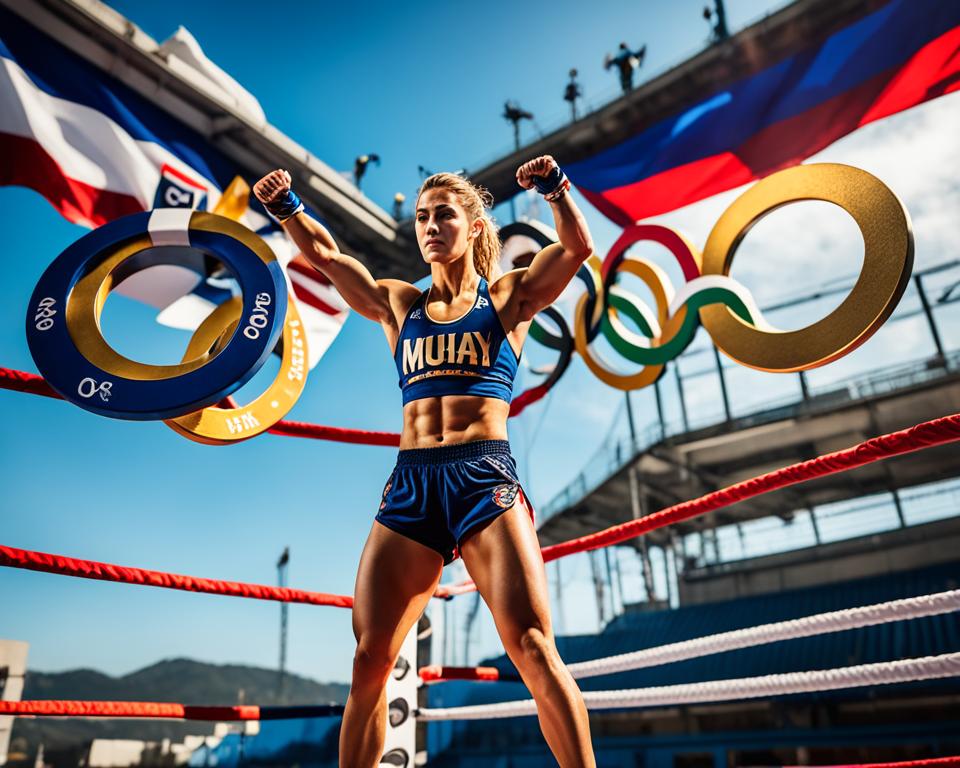
Muay Thai’s Olympic Prospects
Muay Thai is getting more popular worldwide, making it a hot topic for the Olympic Games. Its unique style and deep culture make it a strong contender. But, getting into the Olympics is a tough challenge.
The International Olympic Committee (IOC) might look at how popular muay thai is around the world. Muay thai is big in Asia, Europe, and other places, showing it’s a global sport. This fits with the IOC’s goal of including more countries in the Olympics.
Another big factor is how muay thai is organized. To be in the Olympics, it needs a single group to run the sport worldwide. This could be hard to set up.
There are also worries about safety. The IOC cares a lot about keeping athletes safe. Muay thai is known for being very physical, which might make the IOC question its safety.
So, muay thai’s chance of being in the Olympics is still up in the air. Many things will affect the decision. As more people learn about it, everyone will be watching to see if it makes it to the Olympics.
| Factors Influencing Muay Thai’s Olympic Prospects | Potential Advantages | Potential Challenges |
|---|---|---|
| Global Popularity and Participation |
|
|
| Governance and Organizational Structure |
|
|
| Safety and Alignment with Olympic Values |
|
|
Alternative Pathways for Muay Thai
The Olympic Games are a big deal in sports, but they’re not the only place Muay Thai can shine. As it aims for Olympic status, the sport has found other ways to show off its traditions and skills worldwide.
Non-Olympic International Competitions
Muay Thai has done great in non-Olympic events, where it can be itself. These events let Muay Thai fighters compete against the best globally, without the need to change their style for the Olympics.
- The World Muay Thai Championships, run by the International Federation of Muay Thai Amateur (IFMA), brings together top fighters from over 100 countries.
- The Asian Games, a big event in Asia, includes Muay Thai, showing how popular and competitive the sport is in the region.
- The Southeast Asian Games, held every two years, also has Muay Thai, letting athletes from Southeast Asia compete and represent their countries.
These events have been key in making muay thai in olympics and olympic muay thai more known worldwide. They inspire new fighters and fans everywhere.
Even as Muay Thai aims for the Olympics, its success in these events proves its lasting appeal and the commitment of its fans worldwide.
The Debate: Should Muay Thai Seek Olympic Status?
The debate on whether Muay Thai should be in the Olympics is complex. Supporters say it would make the sport more popular worldwide. It would also bring more people into the sport and lead to more investment.
But, there are doubts about fitting Muay Thai into the Olympic format. Critics worry about changing the sport too much to fit Olympic rules.
Those who support Muay Thai in the Olympics highlight its long history, complex moves, and global fans. They think Olympic status would make the sport more visible. It would draw in more athletes and encourage more international teamwork.
This could mean more money for training, better facilities, and more chances for Muay Thai athletes to shine globally.
Yet, some are skeptical. They think Muay Thai’s unique style, which includes eight limbs and full-contact fighting, might not fit the Olympics. They fear changing the sport too much could lose what makes it special.
This could affect its cultural identity and appeal.
